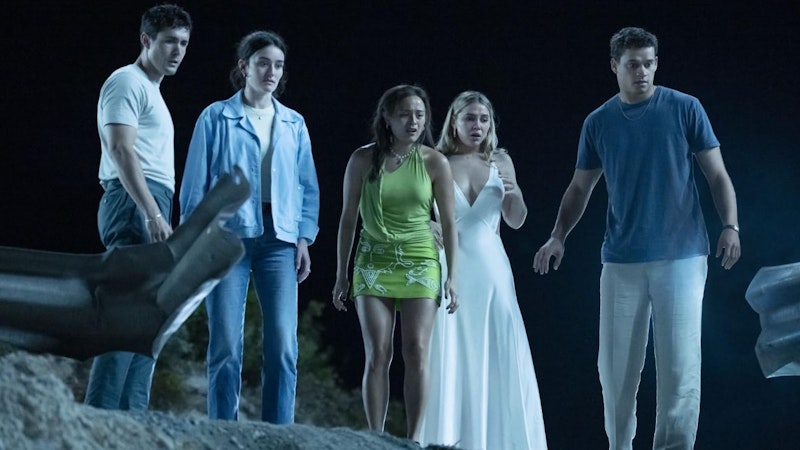The original I Know What You Did Last Summer (1997) is remembered more for cultural impact than quality. Nonetheless, it had some surprisingly affecting performances and a certain thematic coherence—all of which the 2025 remake manages to betray and mangle. Twenty-eight years on, I Know What You Did Last Summer mostly demonstrates that aging can be an ugly process—a moral which does, arguably, resonate with that first film.
As in the first movie, the remake is set in the seaside town of Southport, NC on the Fourth of July. A bunch of friends drive up in the mountain to see the fireworks, and accidentally cause a car accident in which a random motorist is killed. The friends swear not to tell about the wreck and the death—but when they all gather in the same place a year later, they receive a note that says, “I know what you did last summer.” Then (per slasher default) people start to get murdered.
It's a sturdy, straightforward, if not original plot—and yet the sequel still manages to fuck it up. The power of the original (such as it was) came from the fact that the friends who sinned had just graduated from high school. They were all young, hopeful, and filled with life—and then, because of a series of bad choices, their lives were all derailed. Sarah Michelle Gellar as Helen Shivers, a homecoming queen and prospective model whose career and relationship all crumble under the weight of guilt, bad luck, and the relentless disillusionment of time, is particularly memorable, adding real pathos and pain to an otherwise mostly disposable genre exercise.
The remake, though, places the main characters in their early-20s; they’re all adults rather than kids. That makes their decision to cover up a murder substantially less sympathetic. Aging the ensemble destroys the entire thematic heft of the narrative. In the first film, the year after the accidental death is a crucial passage in all the characters’ lives; they’re trying to launch their adulthood, and we see them stutter, stagger, and fail. “I know what you did last summer” refers to the murder, but it also refers to a sunlit moment when everything seemed possible. Their sin is manslaughter, and maybe sex, but it’s also their naïve belief in themselves and their futures, a belief that dead-ends in disappointment and blood. In that context, it’s crucial that the murderer is an old crank in a rain slicker, driven by revenge for particular harms, but also by a generalized resentment of the young for being young, and for daring to inherit a world that the old want to squat in forever.
Without that adolescent sense of fear and failure in the face of growing up, and without the generational tensions, the film has nothing to say. The only pleasures are the usual slasher dynamics of jump scares, gore and whodunnit and some nostalgia generated by the return of Jennifer Love Hewitt as Julie James and Freddie Prinze Jr as Ray Bronson—the two survivors of the fisherman hook killer in the original film.
Even the final twist is underwhelming, though it serves as a kind of rationalization for the rest of the film’s inadequacies.

